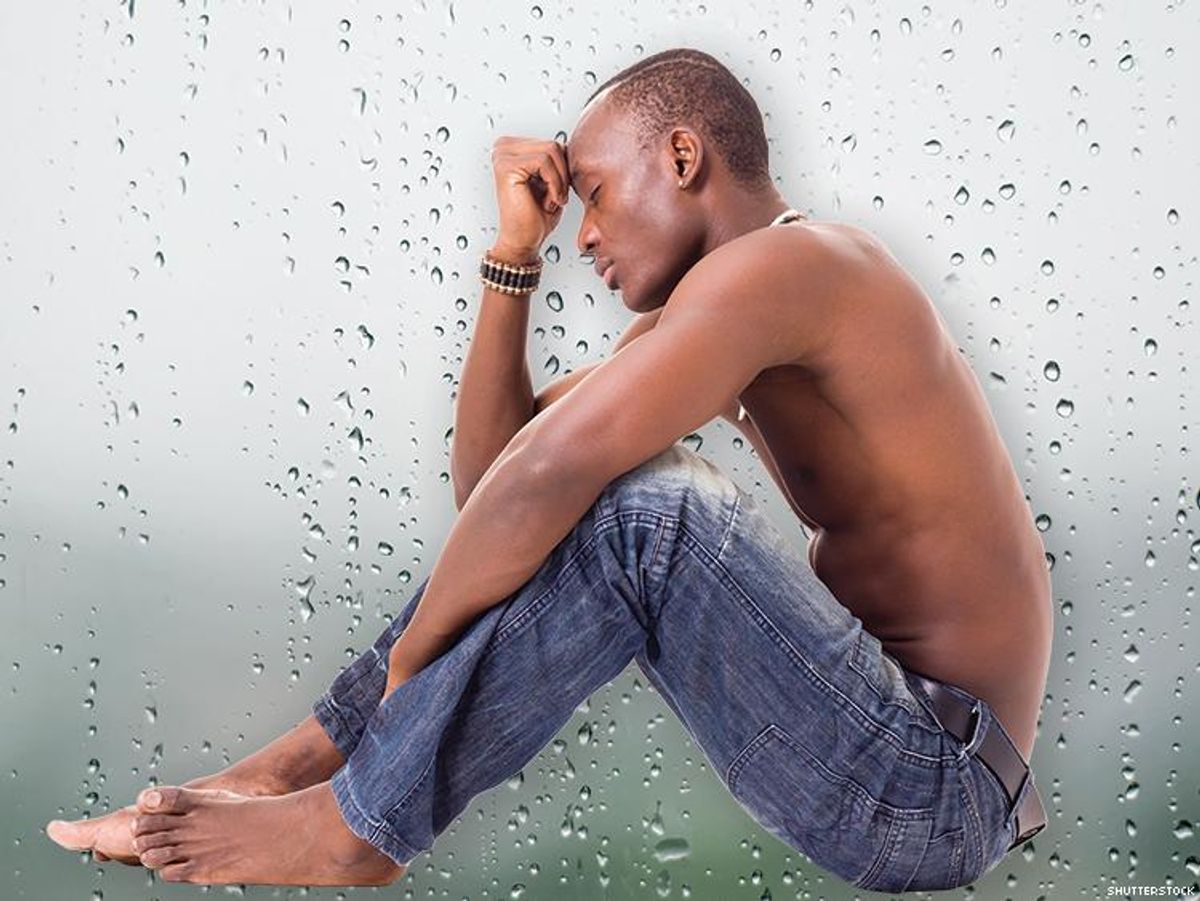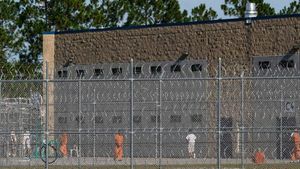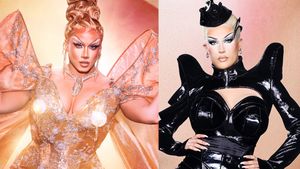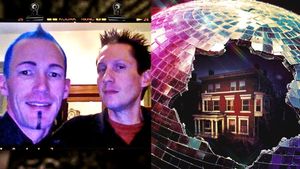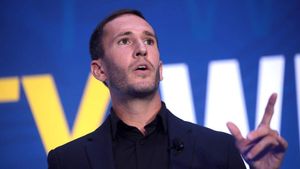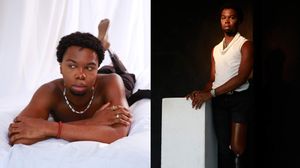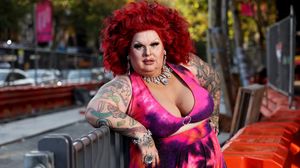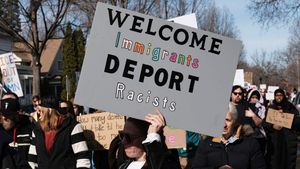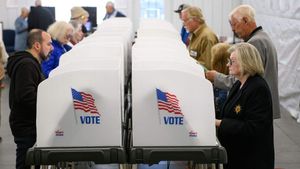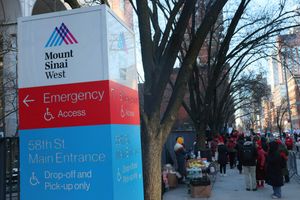Ari Hampton came out to his father when he was 18. It didn’t go well.
Fearing for his life, the gay teen ran away, ending up on the streets of Detroit. To survive, he sold the only thing he had — his body. To deal with the harsh realities of his life and the humiliation of sex work, Hampton turned to drugs and quickly became addicted. In the years that followed, Hampton eventually traded life on the streets for an abusive partner who ended up giving Hampton more than a place to stay and a few stitches. In 2009, just shy of his 21st birthday, Hampton learned that he’d also gotten HIV.
Neither Hampton’s name nor his snapshots hint at the 26-year-old’s mixed-race heritage, but you can hear his African-American roots in his baritone voice (Barry White’s got nothing on this guy). Listening to his story, though, it’s not hard to imagine why Hampton might struggle with depression.
Americans tend to think of depression as a personal, time-based, event-specific, short-term occurrence. Something specific happens to a person, like they lose a partner, and that makes them immediately (but temporarily) sad. Eventually that person gets over it and moves on.
That isn’t what it’s like for people with clinical depression. Their feelings of despair can come out of nowhere, return daily for months on end, arrive hand in hand with anxiety, and be so consuming that the person can’t function, which is why depression is the leading cause of disability.
“It’s not a trigger of somebody doing something towards me,” Hampton explains. “It’s not a trigger of me being stressed out about life. Sometimes it just happens.”
It may come out of the blue, but depression doesn’t strike at random. Certain psychosocial factors — like religion, family, or poverty combined with a person’s thoughts and behavior — mean that some of those most at risk of becoming HIV-positive are also at the greatest risk for depression. Black gay men, in particular, are bearing the brunt of these intersecting factors, leading them to experience higher rates of depression as well as increased HIV risks and negative health outcomes, including early death.
Bottom line: Depression is teaming up with HIV to kill black gay men. But why?

Black, Gay, and Depressed
“If you’re black, you’re gay, and you’re HIV-positive, you’ve already got three strikes,” says Antoine Craigwell (who is pictured on page 31), founder of the organization Depressed Black Gay Men and the driving force behind You Are Not Alone, a documentary that features dramatized re-creations of black gay men’s experiences with depression. Add depression and “you might as well just dig a hole, crawl into it, and pull the dirt over you, because it’s all over,” he adds.
Depression has been a part of Hampton’s life since he was a teenager, but before that, he recalls, “As a kid I was very optimistic and very sunny.” That disposition didn’t survive the abuse and family discord that marred Hampton’s childhood.
“The physical abuse as a kid happened a lot with my dad,” Hampton says. “And it was one of the biggest reasons that my mom left, so it kind of broke up the family.” Hampton grew up in Detroit, long after the Motor City’s heyday in the 1960s. The city’s crime rate peaked in 1991 — when Hampton was a toddler — and Detroit had the undesirable distinction of being the FBI’s “Most Dangerous City in America.” People fled the city, leaving behind an endless supply of abandoned houses and industrial buildings where drugs, arson, and other crimes flourished.
With white flight altering the city’s demographics, Hampton’s skin tone only fueled his growing sense of alienation. “I’m the lightest person in my family,” he explains. “So I basically don’t look like anybody in my community. The majority of the community, most of them don’t think that I am black. I’ve grown up having two worlds that didn’t want to accept me.”
And that was before Hampton came out as gay. “When I was trying to battle myself, trying to suppress my feelings towards men, I think that’s when [my] depression started,” Hampton admits. “When you have childhood trauma, it breaks down your self-esteem. And I think that voice becomes your [internal] voice. It becomes your subconscious telling you, ‘You’re not good enough.’”
That fueled a downward spiral. “Not liking what I saw in the mirror…I stopped eating and ended up forming this very unhealthy relationship with food,” he says. “I would binge and purge all the time. That progressed into taking cigarettes and burning myself.”
By high school, Hampton learned his best friend was not only gay too but “a cutter,” someone who cuts himself for psychological relief.
“We discovered each other’s dark secrets,” Hampton recalls. “And we were like, ‘No more.’ We formed this bond and made sure that we weren’t doing these unhealthy habits.”

Hampton’s anxiety about coming out intensified after his father moved them to Florida. “The family on my dad’s side, they weren’t too accepting,” Hampton says. “As the majority of [them are] African-American or Native American, they didn’t accept that type of ‘lifestyle.’” His father’s abuse made things worse.
“I knew the only way I could come out of the closet was at a time when it was OK for me to get away from the house,” Hampton says. As his high school graduation neared, he finally got up the nerve and came out in a letter to his father.
“He called me and was like, ‘I accept you and everything is cool.’ Then I came home and, immediately, the physical abuse started. The last straw was him putting a knife to my chest and explaining how he could get away with murder and plead insanity.”
That’s when Hampton ran away and “got into some really bad things…I turned to drugs and struggled with addiction and struggled with just trying to survive on the street. I ended up doing sex work and stuff like that. It was very tough.”
Unfortunately, Hampton’s experiences aren’t unique. LGBT youth make up 40 percent of the homeless kids in the U.S., and more than half experienced abuse at home, while 68 percent cited family rejection as a factor in their homelessness. Family rejection, stigma around nonconforming gender expression, and “minority stress” (the prejudice, stigma, and discrimination encountered by minorities, including LGBT people) have also been shown to increase mental health problems and suicide rates.
Here’s where the numbers tell the story: Gay and bisexual men are twice as likely as straight men to experience anxiety or depression in their lifetime. Among those who are also black, a full 33 percent suffer from depression, in part because of the impact of other factors like poverty, discrimination, and mass incarceration in addition to homophobia.
The biggest contributors to depression in black gay men, Craigwell says, are issues around “sex, sexuality, and sexual identity; the role of the church; contracting HIV; being out as a black gay man; and sexual abuse.”
A 2003 study noted the prevalence of childhood sexual abuse among gay and bisexual men at risk of becoming HIV-positive. Other health problems common among the group included substance abuse, intimate partner violence, and depression, all of which have a compounding impact on each other (an occurrence known as a “syndemic” in public health jargon). For example, gay men who had suffered childhood sexual trauma were more likely to experience partner violence and depression.
Elsewhere, depressed people were shown to be more likely to
have substance abuse issues and engage in survival sex (sex for money or housing) as well as sex while under the influence of alcohol or drugs.
Depression Compounds HIV Risks
With greater odds of being depressed comes a greater probability of becoming HIV-positive.
Craigwell sees becoming HIV-positive as an expression of black gay male depression: “The stigma, the discrimination, and the homophobia from the community causes an individual to descend into depression where he no longer cares about himself and he contracts HIV as a passive form of suicide.”
Research backs him up. “People with serious mental illness are particularly vulnerable to HIV infection as a result of the higher prevalence among this group of a variety of factors, including poverty, homelessness, high-risk sexual activities, drug abuse, sexual abuse, and social marginalization,” says a report from the U.S. Department of Health and Human Services Health Resources and Services Administration.
Some of the seminal research showing mental illness could have a negative impact on HIV health outcomes has come from Jane Leserman, an expert in psychoneuroimmunology (the study of the relationship between psychological and neurological issues and immune system factors).
In the early 1990s, Leserman noticed that some people with HIV were surviving their infections, while “other people immediately fell ill and developed AIDS,” she tells Plus. To find out why, she launched a 14-year longitudinal study, which showed that people with “more cumulative stress and more cumulative depression” tended to more quickly convert to AIDS, die, or see a dramatic and dangerous drop in T cells.

Leserman says no one has yet been able to pinpoint the “biological mechanism” behind that interplay. “It could be that trauma and stress has a direct impact on our immunological response,” she says. “[Or] it could be that people who have more trauma and stress have poorer health habits and maybe neglect eating properly or taking care of themselves.”
Leserman later found similar negative outcomes among those who had experienced trauma, including “having parents die at a young age, having alcoholic parents, having depressed parents, having violence in the home,” or having experienced sexual or physical abuse.
Childhood trauma, whether it’s sexual or physical in nature, casts a long shadow, Leserman says: “There are tons of studies that show that people who grow up with childhood trauma end up [with] more medical conditions…they looked worse on every measure we had. Whether it was functioning poorly in the world, whether it was chronic pain, doctor visits, or hospitalizations.”
People of color are both more likely to have survived trauma and to experience a syndemic factor that “magnifies the vulnerability of a population to serious health conditions such as HIV/AIDS” or depression, researchers noted in a 2003 study. Syndemic factors also include living below the poverty line, which a more recent study found makes people nearly 2.5 times more likely to have depression than those living at or above the poverty level.
Like Hampton, Bryan C. Jones is a black gay man who has experienced that magnifying effect firsthand, but you’d never know it. As gregarious as they come, Jones laughs and jokes frequently in every conversation. Sitting across from him, you’d never suspect he battles depression. But the 55-year-old, who lives with depression and HIV, grew up in poverty, in “the heart of the ghetto” in Ohio, and ticks many of the risk categories.
When he was “very young, like 3, 4 years old,” Jones was sexually molested, an experience that may have played a role in his later struggles with depression and substance abuse. Substance abuse often goes hand in hand with depression, and HIV-positive gay and bisexual men have a 42 percent chance of abusing alcohol or drugs in their lifetime.
Drugs helped Hampton and men like him survive life on the streets.
“In regards to homeless youth, [crystal meth] really is a survival drug,” Mike Rizzo, a manager of addiction and recovery services at the Los Angeles LGBT Center, told Healthline. “It helps them stay awake all night so they are safer on the streets. It staves off hunger and thirst.”
Other gay men may turn to drugs and alcohol to self-medicate their depression or combat the feelings of shame some poz people feel when they first learn of their HIV diagnosis.
“It was hard for me to swallow,” Hampton admits, “because I knew what I knew about HIV.” While living in Florida, Hampton had volunteered with an HIV service organization. “I knew how to protect myself,” he says. So it was especially upsetting when he discovered he was poz. “Now here I am living with it. I ended up relapsing back into drugs.”
Jones says he still deals with his own substance abuse issues, although to him, “it doesn’t necessarily have to be a narcotic substance. Dealing with people who are only in your presence to see what they can get out of you? That’s a substance. [We] don’t talk about the reality of how we seek out sex to bring us out of our depression, to make us feel like we’re loved, like we belong. Until we start having these open and honest conversations about substance abuse, sex addiction, and how all that is tied to our depression, we’re never going to be able to [get] any real treatment.”
Like sex addiction, intimate partner violence is an uncomfortable topic, and yet another psychosocial factor that disproportionately impacts gay men of color. Research suggests that gay and bisexual men experience intimate partner violence at significantly higher rates than heterosexual men. Social pressures, which researchers in one study defined as “homophobic discrimination, internalized homophobia, and heterosexism,” were found to “significantly increase” reports of gay intimate partner violence.
Hampton says intimate partner violence gave him HIV. An argument over his partner cheating “got physical,” and “because of the physical fight and me hitting him in his mouth, he started bleeding really profusely. Then he ended up taking out a chunk of my chin [with his teeth]. And I ended up acquiring HIV through that rare blood-to-blood transmission.”
Like many men in these situations, Hampton found his report of domestic violence was met with indifference. “When the incident happened,” he says, the police came out, “and they basically told me, ‘There’s nothing that we can do.’ And they were like, ‘You’re a man, why didn’t you fight back?’”
The Heart of the Matter
Statistically speaking, being HIV-positive is depressing. Numerous studies have shown that people living with HIV have higher rates of mental health problems — between 50 and 60 percent of adults being treated for HIV also have symptoms of a psychiatric disorder (a rate over four times higher than in the general population).
When it comes to depression (and related anxiety) the Health Resources and Services Administration reports that elevated rates among people living with HIV exist regardless of race, gender, or sexual orientation. In one study, 37 percent of HIV-positive respondents indicated they currently or previously experienced depression. Even when eliminating self-reported studies in favor of professional diagnoses, poz people were found to have twice the depression rate of the general population. Up to 20 percent of HIV-positive people already have depression when entering care, but HIV can also aggravate psychiatric problems.
Having moved from Ohio to the “gay black mecca” of Atlanta, Jones became more and more depressed as he was diagnosed with AIDS in 1984 and told he had six months to live, and watched once-vibrant friends wither and die around him.
“I lost a lot,” he says now. “Most of my friends. You know, 60, 70 people in the span of a few years.”
Waiting for his own death, Jones struggled with a growing sense of isolation. “I’m like, When is it my turn? For whatever reason — I’m still trying to figure it out — everyone else just died.” But death didn’t come for him.
“That made it even more depressing,” Jones recalls. “They died in six months, and it’s been 10 months for me. Why are you prolonging this agony? Years go by and I’m still here. Come on already! I need to go ahead and die and get this over with!”
Regardless of what causes a person with HIV to develop depression, it’s not a healthy combination. For one, depression has been linked with a threefold decrease in adherence to any medical treatments, including antiretroviral therapy. It’s also associated with missed appointments, failure to begin HIV care, poor treatment outcomes, and provider reluctance to even prescribe HIV meds for fear the depressed patient won’t take them. A national study confirmed that depression in HIV-positive people also negatively impacts both their quality of life and their lifespan.

In other words, depression combines with HIV and other contributing factors to cause premature death.
People with higher HIV viral loads and lower mediation adherence tended to have multiple syndemic factors, noted a study published in the journal AIDS last year.
“These findings indicate that combinations of depression symptoms, polysubstance use, and sexual risk behavior function as profound barriers to fully reaping the benefits of successful HIV care and that, as these conditions snowball, their impact on HIV outcomes is exacerbated,” wrote the researchers, led by M. Reuel Friedman of the University of Pittsburgh.
Studies have suggested that poverty and racial/ethnic minority heritage have similar negative impacts on HIV health outcomes. The more of these psychosocial factors a person had, the less likely they were to achieve positive health outcomes. The more concurrent issues a person had, the less likely they were to adhere to treatment and the more likely they were to have a higher viral load.
“Those meds, they are a constant reminder that you’re positive. And a lot of people stop taking them because of that,” says Hampton.
“I tell people I’ve been living with HIV for 31 years, and I didn’t get that way by doing everything right,” Jones says, acknowledging his own struggles with adherence. “But, even in my depression, I take my medication. My doctor always told me ‘Take your medication. I don’t care if you wash it down with vodka, just take your medication!’”
Still sort of “waiting to die,” Jones went to college and toured the country doing musical theater (including his one-man show, And I Die Slowly). But depression kept dropping in and wrecking his life.
“I’m college-educated, I’ve traveled to several countries performing, but my depression led me to prison,” he says. “And having stage 4 cancer, with one leg chained to a bed while being depressed? It’s not something you want to experience.”
After over 20 years of being HIV-positive, Jones says it finally hit him that he wasn’t dying slowly. He was living.
“It took all of that shit to make me realize, ‘I’m not going to die!’ And then the doctor came into the room and told me I was going to die.” With a stage 4 cancer diagnosis, Jones’s prognosis wasn’t good. The doctor gave him two weeks to live. “‘Shit,’” Jones recalls responding, “‘we’re all going to die, that has a 100 percent success rate!’ And it didn’t happen. I’m still here.”
It was around that time, Jones says, that he began to accept that depression “is going to be my constant friend. It’s going to be as close to me as the blood that is in my own veins — like HIV.”
After he got out of prison, Jones founded Gentlemen’s Quarterly, a men’s support group with more than a hundred members. He’s a peer educator, sits on the steering committee for the Campaign to End AIDS, and is an anti-HIV criminalization activist. But he doesn’t work directly for an agency, and he says that has given him the freedom to speak his mind.
“Everybody else in the room wants to say it, but [they] can’t. So I say it.”
That’s important because Jones says he now realizes, “In many instances, my depression stemmed from not being able to say what I wanted to say at the time. And then I took it home with me.… Why did I let this guy talk to me like that? Why do I feel that maybe they’re right? Maybe I’m not worth shit.”
Now he speaks his truth, but Jones admits he’s
discovered “a whole other depression.”
“Now I’m dealing with HIV and aging,” he says. “I’m dealing with a new set of issues. It goes back to that loneliness thing. Will I ever find somebody to love?”
He may be lonely, but Jones isn’t alone: 40 percent of long-term survivors and older HIV-positive individuals show signs of major depression, according to researchers who found HIV-related stigma and loneliness were two significant causes.
Depression, anxiety, and substance abuse can have such a profound impact on the health of someone with HIV that HRSA ranks diagnosis and treatment of mental health issues as essential to the physical health and quality of life of people living with HIV or AIDS. But treatment can’t work if you don’t go.

Being Black Means Never Having to Say You’re Crazy — or Depressed
Black gay men are more likely to suffer from depression, they have a heightened risk of becoming HIV-positive, and having depression exasperates that risk. Once HIV-positive, black gay men are at higher risk of having poor health outcomes, and those negative outcomes are further compounded by their depression. As if those snowballing syndemics aren’t enough, black gay men are also less likely to get care for their depression.
“The black community and depression is a whole other monster,” Jones says. “First of all, we can barely treat our physical ailments, much less our mental illness ailments. People are not going to go to a doctor when you say, ‘You crazy.’ Hell, who ain’t crazy? Living under our conditions, we all got a little crazy.”
Leila Day, a reporter with California radio station KALW, agrees with Jones.
“The statistics are there,” she says. “If you grew up in a low-income, poor, impoverished neighborhood area, then you are much more likely to have depression. That’s just the reality.”
Day received a California Health Journalism Fellowship to examine why African-Americans are 20 percent more likely to have major mental health problems than the general population but tend to not seek out care.
“Especially for older black Americans, there is a lot of fear around even seeing a physician,” Day says. “Black populations haven’t had the best record with issues like the Tuskegee experiment. So putting your trust into a medical professional is a big step.” (In the Tuskegee experiments, rural African-American men with syphilis were told they were being treated for “bad blood,” but in fact never received care and were studied for 40 years.)
Dr. Loma Flowers, a clinical professor of psychology at the University of California in San Francisco, told Day, “I think in general, poor people have not been the allowed the luxury of mental illness. They don’t have time, they don’t have the money. It’s a disease of the rich.”

Historically, she added, for black people in America, “not getting out of bed was not an option.” Whether they were literal slaves or just slaving away at low-paid jobs, African-Americans have rarely had the luxury of taking “sick days,” particularly when it comes to mental health care, which has also been stigmatized for generations.
“If you tell somebody I’m having this feeling, you know what they say? ‘Get over it.’” Jones laughs with irony. “Depression is equated with being crazy, and they’re going to lock you up somewhere.”
That fear isn’t unjustified. Flowers points to the U.S.’s history of incarcerating the mentally ill, a practice that Day says is rebounding. “The number of people that are incarcerated that actually have mental health illnesses,” she says, is “devastating.” More people with mental health issues are in prisons than in hospitals, and up to 50 percent of prison inmates have mental health problems.
In the past, white mental health professionals have also been a little too eager to pathologize African-Americans for perceived lax sexual morals, absent fathers, and overly assertive (and in Freudian terms “castrating”) women.
“The idea of actually seeking help” by going to a therapist, Day says, “was definitely seen by many older black folks as something that community is not used to.”
Hampton concurs. “Especially in the African-American culture…there is no belief system in mental health care,” he says. “‘You don’t need to go see no therapist’ — that’s usually how my family feels. ‘Why do you need to see a therapist?’”
“Having to see a therapist or psychologist,” Day found, “was seen as a vulnerability and a weakness.” That’s a feeling particularly common among young men of color, who according to a 2015 study are more likely to believe “mental illness and treatment-seeking were signs of weakness and can embarrass or shame family.”
“I think we have a sense of what manhood is in our community, in our culture,” Jones says. “And that perpetuates a certain type of stigma.”
Craigwell feels that resistance to mental health care is furthered by the message that religion can solve everything. “There are still some in the black community who will not take HIV medications,”
he says. “They’ll go to church, and they’ll pray that God takes it away.”
That was something Day heard as well. “A few people said that their older relatives would just say, ‘Pray about it. There is nothing you can do but pray.’”
Craigwell, who recently organized the first conference on mental health for LGBT people of color, has been disappointed by a lack of support from other black gay men. And, he wonders, “Where are the black mental health professionals?”
Day found herself asking a similar question during her investigation. Only 2 percent of psychiatrists and psychologists, and 4 percent of social workers are African-American. Day believes that cost and time commitment and relatively lower pay make pursuing degrees in these fields less appealing to African-Americans. But the absence of black or even “culturally competent” therapists does play a role in keeping African Americans from seeking help.
While racial disparities in seeking mental health care persisted regardless of family income, a recent surgeon general’s report maintains that a lack of insurance coverage is to blame. With insurance? The disparity in who gets help reportedly disappears.
Hampton discovered firsthand what happens when it’s the coverage, not the disparity, that disappears. Despite his depression, he’s become an HIV activist, working in prevention at the Horizons Project, involved with the HIV Stigma Index Project, honored on the 2014 Poz100 list, and representing the U.S. on the steering committee of Global Network of People Living With HIV’s youth group.
His mental health care used to be integrated with his HIV youth services. But now that he has aged out of that system, Hampton says he’s struggling. “Trying to work a full-time job, trying to advocate for people…basically building your life as a young adult — you don’t have the time to…see a therapist, plus pay the cost, plus try to battle with the insurance companies. It gets overwhelming.”
That’s not a good place for someone who admits, “I’ve tried to commit suicide three times.”
Jones knows what that feeling is like.
“When I get to that point where I’m thinking about ending my life,” Jones says he starts to plan his funeral in detail. “Before you know it, I’m up and choreographing the pallbearers, and it’s turning into a production number, and then I videotape myself [saying,] ‘If you’re watching this tape, then you’ll know I’ve moved on.’ And I’m singing [Cher’s song] ‘If I Could Turn Back Time.’ I’m going to have a big production number before I go!”
Laughing at himself, suddenly Jones feels a little less depressed after all.

Is Depression Prevention Actually HIV Prevention?
A rousing song-and-dance number may pull someone out of the blues. A round of antidepressants and a few sessions of talk therapy can resolve an individual’s depression, or it can at least bridge the chasm over dark moments when someone with depression begins to imagine a more permanent solution to the emotional and physical pain they feel.
But what if what has long been considered a psychiatric problem may actually be more of a social one: a psychosocial force that can disproportionately impact some of our most vulnerable populations and affect nearly every aspect of their health, happiness, and survival? Depression is a litmus test for social ills and the unexpected consequences of being raised in an environment with poverty, racism, and violence.
Depression is a persistent factor that aggravates and is exacerbated by numerous other psychosocial elements pervading black gay men’s lives. Ending depression and its myriad negative influences on a person’s physical health may turn out to be far more of a policy or economic issue than a psychotropic one.
As the authors of a study about psychosocial health problems concluded, “The existence of syndemics may make it difficult for some [gay and bi men] to respond to the messages of standard HIV prevention programs. Put another way, men who are mired in the combined effects of depression, substance abuse, and violence may not have the capacity to reduce their sexual risk.”
Similarly, the study on older poz people suggests that efforts to reduce HIV-related stigma and loneliness may serve as a back door to reducing major depressive symptoms and thereby improving health outcomes. Depression has a particularly deadly impact on the health of people with HIV, so preventing the multiple factors that lead to it could be integral to efforts to eradicate HIV. The effectiveness of prevention efforts and attempts to decrease HIV treatment disparities could be improved if they integrated new efforts to address mental health, substance abuse, and domestic violence within high-risk communities.
For now, it seems, until issues facing the broader black population — including systemic poverty, institutionalized racism, and the stigma attached to mental health services — are addressed, it may simply be impossible to eradicate depression and HIV among black gay men, except on a one-to-one basis. Craigwell says the participants in the film reported that “it was therapeutic to be able to share their stories on camera, because they were doing something that was previously unheard of: that a black gay man would actually sit in front of a camera and talk his business in public.”
Leserman agrees. Remember, treatment works wonders, experts say, and talking is critical. Trauma, HIV, and heightened risk factors do not need to define you.
“I don’t want to make it sound like because you had a lot of trauma in your childhood, that you’re going to be doomed,” Leserman says. “That’s not the message I want to give out. I want to give out a message of hope. Get help, deal with these problems that occur to you, and work through them, and [you’ll] have a healthier life mentally and physically.”
Jacob Anderson-Minshall is a contributing editor at Plus. This
article was produced as part of the 2015 Equal Voice Fellowship for journalists, in partnership with New America Media and
the Marguerite Casey Foundation.
All photos (unless noted) are from the film You Are Not Alone, a doc about black gay men and depression.
